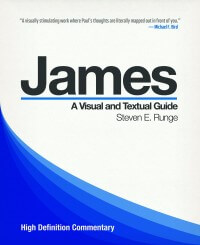There is great significance to words—not only what is said but how it’s said. We often choose to say something a certain way for emphasis, to direct the conversation, or to better communicate our point. We don’t overtly think about these devices, but they’re incredibly important if we want to fully understand what is being said. There is a deep connection between the feelings of the heart and the words of our mouth. Our innermost feelings often find a way to be vocalized, whether we mean it or not. The connection between the tongue and the heart is a major theme in the book of James.
In this excerpt from High Definition Commentary: James, Steve Runge shows how James emphasizes the power of our words—and draws out the implications for our digitized world.
Small but great
Remember James’ comment in verse 2 that we all stumble in many ways. By zeroing in on the tongue just after this, he implies that the perfect person can avoid stumbling if they keep their whole body in check. How? Well if the tongue really does direct the whole rest of the body, then our attention should be focused on controlling it. James personifies the tongue, making it sound as though it alone directs our speech, not our brains, thoughts, emotions, or heart. He uses contrasting emphasis in Greek to highlight how great a forest is set ablaze by how small a flame. His thoughts about the power of the tongue echo what we find in Proverbs 12:18–19 and 21:23. Instead of quibbling over whether the tongue acts of its own accord or not, we had better pay close attention to these important lessons about the impact of our speech.
Small but Great. James draws upon tangible examples from our world to reinforce his point about the potential destructive power of the tongue. In the same way that a horse’s bit or a ship’s rudder and direct the course of something far larger. And in the same way that a small flame can reduce an entire forest to ashes, the tongue can bring about the same kind of destruction.
James’ warning about the tongue is more critical today than ever. Now instead of just needing to control our speech with those around us, we must also watch our ‘electronic’ tongue. The anonymity of the Internet has brought with it harsher forms of rhetoric compared to interpersonal dialogue. The impersonal nature of email or online posting makes it easier to write things we’d likely never say to a person standing in front of us. Add to this the lack of gestures, intonation and other non-verbal cues, electronic communication clearly holds much more potential for miscommunication and misunderstanding than speaking in person; nevertheless it still leads to the same kind of devastating outcome. Controlling our speech, whether live, snail-mail, or electronic, will significantly impact our relationship with others. We must heed James’ warning not to allow it to burn and destroy.
One-of-a-kind teaching tool
The High Definition Commentaries are a guided tour of Scripture, highlighting important issues and illuminating linguistic clues to help you fully understand the text. Drawing on his discourse analysis work, Steve Runge examines the linguistic and literary devices in the text to draw out the full meaning of Scripture. Many of these complex ideas are graphically represented in beautifully designed slides to explain the text and help you retain its meaning. These one-of-a-kind commentaries are invaluable for students, pastors, and anyone looking to dig deeper into the biblical text.
***
Get High Definition Commentary series—James today.







